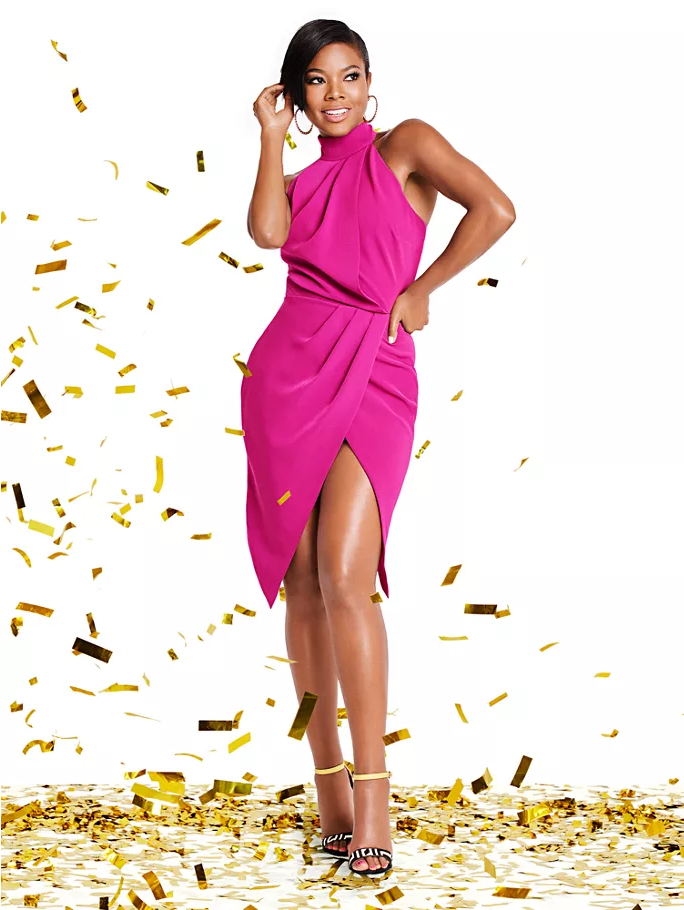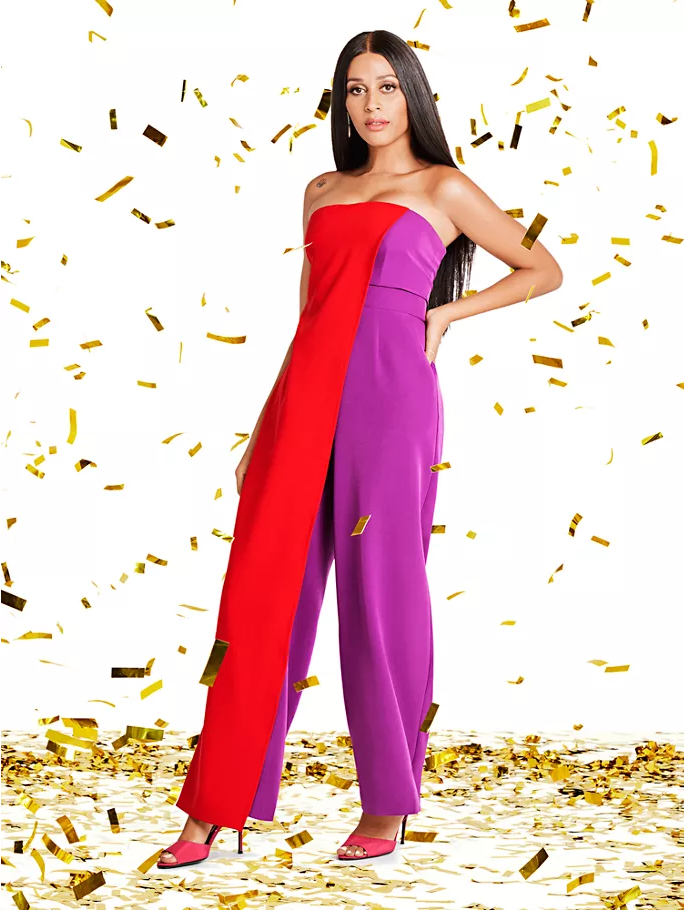Gabrielle Union: "I Have to Speak Truth to Power"
Speaking on a panel at the launch of her New York & Co. holiday collection, Gabrielle Union got candid about inclusivity, privilege, and Instagram.

Gabrielle Union is a badass. I knew it the second I saw her play Bianca's bestie in 10 Things I Hate About You, and again when she slayed as Isis in Bring It On. She has a certain demeanor that makes clear she is kind, caring, and educated, but not to be messed with. When I arrive at the event Union is hosting, I’m drawn to her, and as soon as she speaks, I know she means business.
It’s this attitude that has landed Union roles like Sydney Burnett in L.A.’s Finest; her own hair care collection; and a clothing line with New York & Company, which has partnered with Fashion To Figure to offer better fits. On Monday morning, Union, who's wearing all-black with her hair in a high pony, was joined by four other powerhouse women—founder of HBFIT Hannah Bronfman, stylist Solange Franklin, model/activist Ebonee Davis, and cofounder of Plus Model Mag Maddy Jones—for a panel discussion: "The Power of Inclusivity and The Women Leading The Charge." The women discussed sharing their true selves on social media, what inclusive sizing really means, and following their passions to achieve their purpose. Get ready to feel inspired by Union's contributions to the panel, below.
On being her truest self on social media:
"I just reject the sweater set. As I’ve gotten older, people in the comments are like ‘Um, dress your age!’ Ma’am, I am. I’m 47 and look, this is what I’m dressing as. [Laughs] Some people, they find, like, I live for a bikini pic...I love when people celebrate it or are, like, scandalized by it. Like, why do you have such strong feelings about my ass? I find that fascinating. Let my ass set you free. Like whatever it is, whether it’s my ratty robe or my scarf or whateve, you’re gonna see it, I don’t care. I had to release being validated by everyone and no one."
A post shared by Gabrielle Union-Wade (@gabunion)
A photo posted by on
"The world keeps on ticking if you live your absolute truth, and my most authentic truth, whatever that is in any given setting, has always gotten me more. The more time I try to conform to whatever is happening in the moment, whatever beauty trends or styles, it’s when people are like 'Hmm,' but the second I wear my natural hair, everyone is like 'Yesss!' but my whole career it’s been like ‘Put it away, tame that beast.’ Don’t be afraid of your most authentic self, whatever that looks like. It’s going to be the thing that allows you to connect. It’s going to be the bridge, your most authentic self. People are actually interested in you and not the weird representative that you send that you think is the appropriate version."
On making space for inclusivity in her holiday collection:
"It’s easy to lead with your numbers and your success. The better business move is to center where you’re weakest, center your blind spots. But if you don’t have the right people on your team you’re not going to ever know what those blind spots are...It’s not enough to say ‘Oh, we’re offering extended sizing.’ If it doesn’t fit right, it ain’t right. And that’s what it all came down to: How many more people can I cover well? And you have to shut up when you’re not doing it right and you’re ignoring 67 percent of American women [who are plus size], so if you are hanging your hat on diversity and inclusion but you’re omitting 67 percent of the population, you’re failing miserably.
"I don’t want to fail miserably at anything, so I have to get it right. And I want the fit to be right, I want to fashion to be right. I got hit with some things today and I’m like ‘ding, already on it.’ Because once you know better and you don’t do better, you’re wack. I’m not interested in being wack, so..." [shrugs]
On fighting for the underdog:
"It’s the right thing to do. A lot of us come into this work, and by 'the work' I mean, trying to cover us all. Because you see so many people uncovered and so many people silenced and so many people used and oppressed and exploited. For me, it’s just who I’ve always been, and as I’ve developed this platform, I realized that I could use my time in the spotlight, or when they give me a microphone, to sort of further my own needs. I always say, if your activism really only benefits you, you actually aren’t an activist, you’re just selfish. So as long as I have air in my lungs I will always try to cover us all, and certainly I will try to center and amplify the most marginalized of us but that’s just—to me that’s just who I am. And when my brand partners...they know that’s just a part of what you get when we do business."
Get exclusive access to fashion and beauty trends, hot-off-the-press celebrity news, and more.
On why it’s easier to be a leader than a follower:
"When you’re a follower, whoever is leading may not lead you where you want to go...This is not what paradise or salvation or freedom looks like to me. You’re leading me and you’re using me to prop up fraudulent systems or to legitimize BS—to legitimize oppression and exploitation."
On being a person of color in fashion:
"Don’t be the… I don’t know how honest I should be… don’t be the 'happy Negro' that does the bidding of the status quo because you’re afraid...Don’t allow them to call you angry when somebody else saying the same thing is called passionate...So do your best to try to hold the door open, hold people responsible. Yeah, I’m asking you to do the impossible, I’m asking you to put yourself out there on a limb. I’m fully aware that job loss is on the table when you are that person and sometimes you can work low-key backdoor things and you can kind of take your head off the chopping block, but if you’re not doing it, nobody is and there's way too many people that are like ‘I’m here. That exclusivity—oh, that’s me. I'm the gatekeeper and you’re out.’ Oh, for real, oh okay.
On the importance of speaking your truth:
"I’m not new to this, I’m true to this. And when I fall short, I humbly shut the eff up and please, whoever is way more intelligent about the things I’m trying to cover—please hit me to game, hit me to information, hit me to education. But yeah, this is what it is. In every area of my life I have to speak truth to power, so I’m living it. I’m trying to live it."
On picking her moments to fight:
"When you’re black or brown in predominantly white spaces...you realize that you are all of these people’s example of X. I’m everybody’s example of blackness, and I’m like 'Whoa, that’s a lot of responsibility and I’m, like, eight.' But being the chip in the cookie, you are always in these situations where you are seeing things, you are experiencing things, you are hearing things, and you are always presented with a choice: What kind of chip am I gonna be? Am I the chip that you know chips somebody’s tooth or am I the chip that’s going to be smooth and it’s gonna go down easy? And you’re constantly put in this position of: Are you going to assimilate and allow all of this to go on on your watch, or are you going to stand up and say something and immediately get othered as 'that' girl? And you have to make these choices. And you make these choices every day, all day.
"I grew up being called Nicky. ‘Well, I said it in front of Nicky; I mean Nicky’s, like, no I’m not racist; Nicky’s my friend.’ I would be the black Nicky, and immediately you’re always put on the spot of: Well, you let it go down, so it has to be okay for all black people because you didn’t say anything. And eventually I couldn’t sleep...I didn’t have the words at the time as a kid, but I knew I obsessed about every single time I didn’t say something...And every time I would speak up and the world didn’t end, and I could sleep a little bit better and I knew that I was doing the right thing it just made it so much easier. But you are navigating: If I say something what could I lose? And that immediate thing is friends, respect, opportunity. As you get older it’s, you know, educational opportunities, it’s being labeled as X, you could lose a marriage—I’ve lost one—you could lose a job, you could lose everything. But, for me, I can’t have real freedom or peace sitting on the truth and what’s right. I don’t have anything if i don’t have peace and so if I can’t use my voice and call it out as it happens, not years later...I’d rather lose it all then have to sleep and live with knowing I didn’t do the right thing in the moment."
For more stories like this, including celebrity news, beauty and fashion advice, savvy political commentary, and fascinating features, sign up for the Marie Claire newsletter.
Krystyna was the former Social Media Editor of Marie Claire where she oversaw all things social media and connected with MarieClaire.com readers. She came to Marie Claire from Racked.com, where she was the Community Manager. Before that, Krystyna was at Latina Mag and Cosmo for Latinas. She graduated with a Marketing major from Fordham University.


